
This parent guide supports parents in helping their child at home with the 8th grade Science content.
- Subject:
- Science
- Material Type:
- Reference Material
- Vocabulary
- Author:
- Kelly Rawlston
- Letoria Lewis
- Date Added:
- 10/11/2022

This parent guide supports parents in helping their child at home with the 8th grade Science content.

This resource accompanies our Rethink 8th Grade Science course. It includes ideas for use, ways to support exceptional children, ways to extend learning, digital resources and tools, tips for supporting English Language Learners and students with visual and hearing impairments. There are also ideas for offline learning.

In this activity, students play a game that simulates the carbon cycle. During the activity students will compare the carbon cycle before and after the industrial revolution.
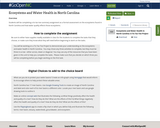
Students will be completing a tic-tac-toe summary assignment as a formal assessment on the ecosystems found in North Carolina and how water quality effects those ecosystems.

This activity explores the function and engineering of dams, how they have many uses, and how they solve many problems in the world. Students work in teams to engineer their own dam structure in a classroom water trough that has the ability to release water in a controlled manner.

Rivers are incredibly important to our society and our environment, but we haven't always treated our rivers as well as we should. By using pictures taken from satellites orbiting the earth, we can examine rivers all over Michigan and try to identify those rivers that appear to have higher water quality and those that appear to have lower quality. Based on the illustrations provided, students will be able to make a number of observations about the quality of Michigan's rivers. Two specific rivers, the Rouge River and Escanaba River, will be observed and conclusions made about water quality and types of land use surrounding it. Lesson success will include having students log into ArcGIS Online to explore the river nearest their home so they can produce a table of observations and a 3-5 sentence paragraph to summarize their findings.
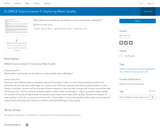
There are many different ways to precisely measure the quality of water in a river. Environmental scientists and volunteers all over the state of Michigan are continuously collecting measurements of the quality of water in rivers, streams, and lakes. Students will look at two of these measures to see how they change with location around the state and along a river. The first measure of water quality is called "water conductance" - that is, how well a water sample can conduct electricity. A higher water conductance generally means lower water quality. The second measure of water quality is "pH." pH is a measure of how acidic or basic water is. Successful students will be able to interpret and analyze data using these two measures to better understand Michigan water quality.

As rain falls all over Michigan, the water gathers in small local watersheds, which feed into larger regional watersheds, which ultimately feed into the Great Lakes. Water that falls on the land in Michigan eventually flows into one of the Great Lakes because the elevation of the Great Lakes is generally lower than the elevation of the land in Michigan. Students will be able to use elevation maps to study water flow from watersheds emptying into the Great Lakes. Success with this lesson will happen when students can investigate the Great Lakes water flow and produce a simple diagram that illustrates this flow pattern.

Students use maps to learn about ocean currents, research case studies about oil spills, and discuss the role of oceanographers.

During this unit, students will learn about the Great Pacific Garbage Patch. They will read about the GPGP and then prepare a presentation with their findings and solutions. Lastly, they will create a prototype to help with the ocean cleanup and use Spheros to maneuver the prototype to pick up trash in water.

In this short video, accompanying activity, and readings, students learn about wetlands by exploring the wetlands at Haw River State Park.
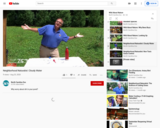
Why worry about dirt in your pond?
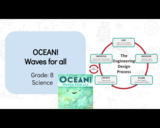
Through a literacy connection with Ocean! Waves for all by Stacy McAnulty and Illustrated by David Litchfield, students will engineer a solution to help the oceans and humans maintain balance given constraints.

This course was created by the Rethink Education Content Development Team. This course is aligned to the NC Standards for 8th Grade Science.

This course was created by the Rethink Education Content Development Team. This course is aligned to the NC Standards for 8th Grade Science.

This course was created by the Rethink Education Content Development Team. This course is aligned to the NC Standards for 8th Grade Science.

VLab: Stream EcologyInvestigate how pollutants affect a stream's temperature, dissolved oxygen, and inhabitants.
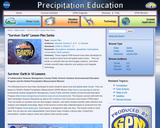
This series of ten lessons has been developed to teach students about local and global water issues. They are based on NASA’s Global Precipitation Measurement (GPM) Mission. The activities are done largely outdoors and include scientific data collection and analysis and integrate technology. Many of the lessons involve data collected based on protocols from the GLOBE Program. Each lesson is designed to take one hour; the lessons build on each other, but can also be used independently. Each lesson topic includes a lesson plan, PowerPoint presentation, student capture sheet and capture sheet answer guide.

Come join us on an adventure exploring our important waterways from the mountains to the sea. As we travel down these waterways, we will be using biofacts and live animals to connect our native wildlife to these vital ecosystems.
We have created helpful clips if you are unable to watch the whole video:
4.L.1
Salamander and Bad Water (1 min)= https://youtu.be/y3p6gTjCbCM?t=975
5.P.2
Water Basins (2 min) = https://youtu.be/y3p6gTjCbCM?t=152
8.E.1
Mountain Basins (1 min)= https://youtu.be/y3p6gTjCbCM?t=199
Piedmont Basins (2 min) = https://youtu.be/y3p6gTjCbCM?t=1822
Coastal Basins (2 min) = https://youtu.be/y3p6gTjCbCM?t=2551
Animal Ambassador Clips:
Spotted Salamander (4 min) = https://youtu.be/y3p6gTjCbCM?t=691
Eastern Box Turtle (5 min) = https://youtu.be/y3p6gTjCbCM?t=1317
Gopher Frog (3 min) = https://youtu.be/y3p6gTjCbCM?t=2375
Conservation Clips:
Keep water clean (3 min) = https://youtu.be/y3p6gTjCbCM?t=2664
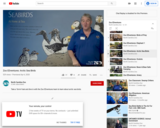
Take a "brrrrrr"eak and dive in with the Zoo EDventures team to learn about arctic sea birds.
We have created some helpful clips if you are unable to watch the full video:
2.L.1 Puffin Life Cycle (2 min): https://youtu.be/emttbP13OFU?t=395
4.L.1 Countershading (30 sec): https://youtu.be/emttbP13OFU?t=817
4.L.1 Murre Egg Shape: (1 min): https://youtu.be/emttbP13OFU?t=933
8.E.1 Ocean Stewardship (1.5 min): https://youtu.be/emttbP13OFU?t=1297